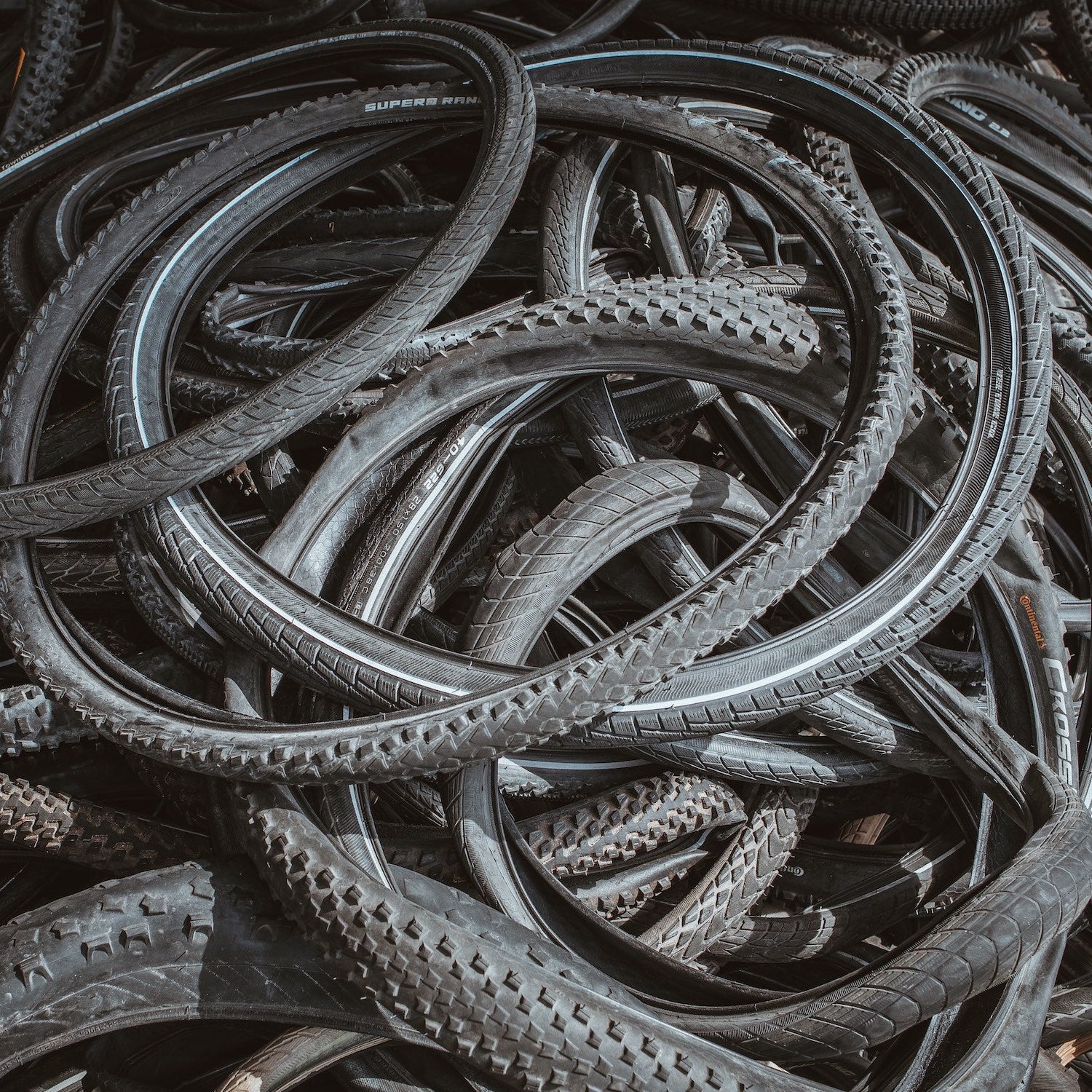There’s something about riding a bike that seems to put you in automatic harmony with nature. After all, you’re outside, breathing fresh air, and propelling yourself along with muscle power, no fossil fuels required. But the bike itself is another story. Materials and manufacturing that support the cycling industry have an environmental and social impact. Some brands are intent on doing something about it.
Schwalbe is leading that charge among tire manufacturers. Headquartered near Cologne, Germany, the company has most recently made breakthroughs in tire and tube recycling—historically a challenge given the various chemical and mechanical properties at play. But together with a coalition of manufacturing innovators and university scientists, Schwalbe isn’t just cracking the code—it’s closing the loop.
Schwalbe set up collection centers across Germany where cyclists can drop off any brand’s tire or tube. Then, at special recycling centers, a novel process separates the component materials. The recycling system, created according to the Cradle-to-Cradle design approach, utilizes all used products (tires in this case) as “nutrients” for the production of the new, high-quality products. The manufacturer just expanded this to collect used inner tubes in the United States as well, projecting to recycle 14 million tires and 13 million tubes by 2026.

More quietly, behind the scenes, Schwalbe has pledged a 55 percent reduction in both direct and indirect emissions, which puts it on track to achieve SBTi-verified net-zero emissions by 2040. Meanwhile, the company actively continues to decarbonize its supply chain. It’s already replaced 100% of coal used in production with biomass as its manufacturing facilities transition to electricity generated from their own renewable energies.
Additionally, the company’s extend beyond the environment: Schwalbe is the world’s only bicycle tire manufacturer to commit to using fair-trade rubber. It’s also investing in social projects in countries where the raw materials are extracted and the tires are manufactured.

The initiatives are not isolated efforts. The recycling program, the emissions reductions, the fair-trade rubber, and the support for workers’ communities are examples (respectively) of Schwalbe’s “Four Pillars of Responsibility,” which include product, company, supply chain, and social commitment. The measures are detailed in an annual CSR report that’s based on the Sustainability Reporting Standards of the Global Reporting Initiative (GRI Standards). These internationally recognized guidelines enable standardization and comparability of all sustainability topics between different companies, even outside the bicycle industry.
The industry-leading moves are worthwhile in their own right. But hopefully they also spark a simple question: What can an individual cyclist do? The answer is in small acts that really add up if we all embrace them. Start with the following seven ways to help lower our sport’s impact.
1. Watch what (and how) you eat
Instead of individually wrapped bars or single-serving drink mixes, opt for food that can be carried in reusable containers or aluminum foil. When you do use individually wrapped products, look for brands that offer recyclable packaging. And when you stop for post-ride tacos, consider going vegetarian.
2. Buy longer-lasting gear
Products made for your level of use and abuse offer a better ride and create less waste. There are bearings meant for wet climates, apparel meant for brushy trails, and tires meant for long rides. A single set of original once made the 9,320-mile journey from Kathmandu to Schwalbe’s HQ outside Cologne. A new Marathon today will last much longer.
3. Repair, don’t replace
Address mechanical issues as they arise before components deteriorate beyond saving. And look into services that mend damaged soft goods like packs and clothes.
4. Dispose thoughtfully
Bike co-ops, charities, and even thrift stores may want worn-out parts. If you have to discard something, bring metal waste to a scrap yard. Most municipal recyclers won’t take complex metal parts, but they should take hazardous waste, like electronic accessories. And if there’s a near you, take advantage of it.

5. Carpool
It encourages people to show up to rides, and (hopefully) show up on time. And if there’s a popular riding destination close to your city, there may be bus service so nobody has to drive at all.
6. Support sustainability-focused brands
Many brands today are implementing programs to reduce impact of products and services. Check websites for information and ask questions at the bike shop to find them. Concerned about greenwashing? Look for company reports with real data, and third-party verification of claims.

7. Spread the love
The more time you spend outdoors, the more you notice humanity’s impact. And hopefully, the more you want to do something about it. Invite friends on rides, meet them on their level, and offer advice. They’ll probably get hooked just like you did, and they, too, will feel that harmony with nature—and want to help sustain it.
develops tires that not only work well, but are groundbreaking in their environmental impact. The epicenter of a desire to always improve is the Schwalbe Lab. There, the company’s development approach uses all of its experience and the latest technology to work on answers to social change—plus design the latest tires in elaborate test series and material trials on- or off-road.

